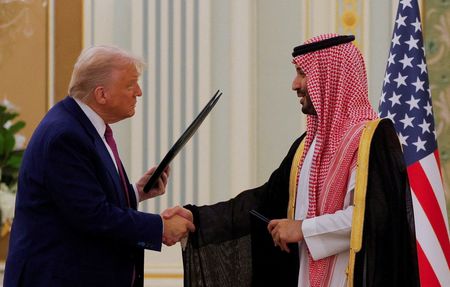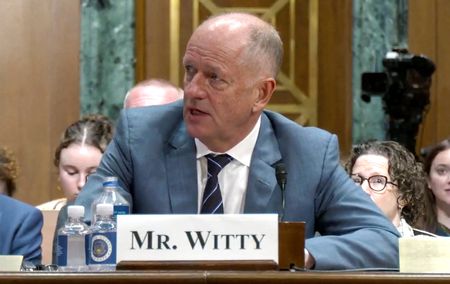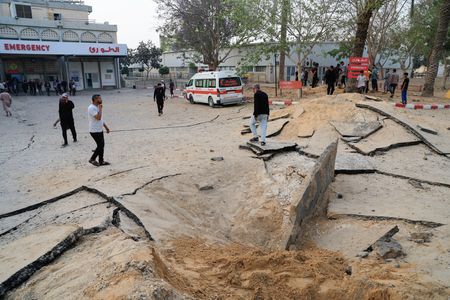By Anastasiia Malenko and Felix Hoske
KYIV (Reuters) – With their ancestral homeland at the heart of future peace talks with Russia, Crimean Tatars are fighting to keep their language and practices alive in Ukraine, teaching some children who have never, and may never, set foot in Crimea.
At a privately-run school just outside Kyiv, acting head teacher Olha Kycha says every child in her care carries “great importance” for Crimea’s future – a new generation she believes will be crucial in the struggle to preserve Tatar identity.
Muslim Tatars, who have endured a history of persecution and forced relocation, regard Crimea, the focus of centuries of conquest and power struggles, as their rightful homeland.
More recently, Russia’s annexation of the Black Sea peninsula in 2014 led to another wave of displacement, with many Crimean Tatars fleeing to mainland Ukraine.
The territory’s future has been pushed to the forefront of future peace talks between Ukraine and Russia after U.S. President Donald Trump’s envoy Steve Witkoff set out a proposal that Russia should be handed U.S. legal recognition of its control of Crimea – an idea rejected by Kyiv.
In response, Ukrainian and European officials proposed deferring detailed discussions about territory until after a ceasefire is concluded to end Russia’s war, with no mention of recognising Russian control over any Ukrainian territory.
Crimean Tatars, who numbered around a quarter of a million in Ukraine’s last official census in 2001, can do little more than watch, wait and hope.
“For us, every child who is here has huge value,” Kycha said of her school, with its manicured gardens that she describes as “the only island, a piece of Crimea in the Kyiv region”.
“Although there are not so many of them, each of them is really of great importance in the future after the de-occupation of Crimea.”
The school’s brochure says it “promotes the preservation of the traditions and customs of the Crimean Tatar people, and the study of Crimean Tatar poets and writers”.
Sitting in the school’s well-equipped, underground gym waiting for another air raid alert to end, six-year-old Rukhiye says she doesn’t like being told to stay indoors. But her dream isn’t to play outside, she says, it is “to go to Crimea”.
HARSH TREATMENT
Sitting in his mosque in the Ukrainian capital Kyiv, Ayder Rustemov, a 45-year-old mufti, recounts how he has lived around half his life in Crimea, returning with his family from deportation to Uzbekistan in 1988, only to flee after Russia’s 2014 annexation.
“We live by faith,” said Rustemov, elected mufti of Crimean Tatars after Russia seized the territory.
“If we recognise Crimea as Russian … I don’t even know what the consequences could be. Just unimaginable consequences,” he told Reuters, suggesting it would set a dangerous precedent for other land with disputed claims.
Sunni Muslims of Turkic origin, Crimean Tatars were deported en masse to distant parts of Central Asia by Soviet forces during World War Two for alleged collaboration with the Nazis.
Crimea became part of Russia within the Soviet Union until 1954, when it was handed to Ukraine, also then a Soviet Republic, by Stalin’s successor Nikita Khrushchev, a Ukrainian. Crimea’s Tatars only began to return from exile in the 1980s.
Most Crimean Tatars boycotted a referendum in 2014 which posed the question of rejoining Russia or restoring Crimea’s status as part of Ukraine – Crimea’s Moscow-backed leaders said 97% of voters were in favour of seceding in a vote condemned as illegal by Kyiv and the West.
Since then, Crimean Tatars say they have been the target of Russian persecution: harassed, intimidated with threats and enforced disappearances. Thousands have fled, representatives say, although there is no official data.
The Kremlin could not be reached for immediate comment. Russian officials deny any modern-era persecution and say Russia has supported all peoples living in Crimea after years of neglect under Kyiv’s rule.
“The parallels are obvious,” Rustemov said, drawing a direct line to the actions of the Soviets to what Russia was doing now. “The goal of Russia has not changed, only the form has changed.”
QUESTION CLOSED?
Russia says the question of Crimea’s status has been closed “forever”, but President Volodymyr Zelenskiy says Ukrainian sovereignty of the peninsula must be restored in efforts to end the war, triggered by Russia’s full-scale invasion in 2022.
That stance has already put the Ukrainian leader at odds with Trump, who suggested on April 28 that Zelenskiy was ready to give up Crimea as the price of a peace deal with Russia.
Zelenskiy has repeatedly said Crimea is Ukrainian territory and recognising the peninsula as part of Russia would violate Ukraine’s constitution.
For now, many Crimean Tatars can only hope for a return to their homeland.
“Those (Crimean Tatars) who’ve stayed in Crimea probably have it harder,” said Diliaver Saidakhmetov, 36, leaving a mosque in Kyiv. “Still, the majority of Crimean Tatars that live in Crimea continue dreaming about a free Crimea.”
(Reporting by Anastasiia Malenko, additional reporting by Anna Voitenko; Writing by Elizabeth Piper; Editing by Ros Russell)








